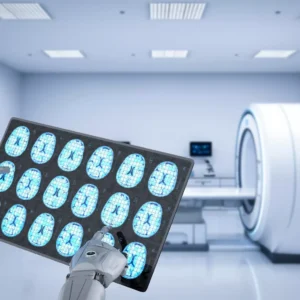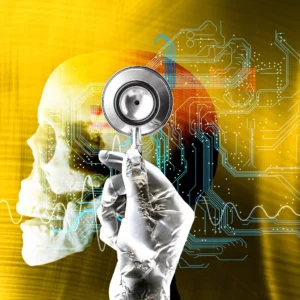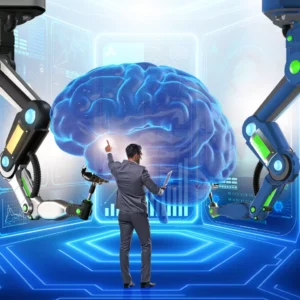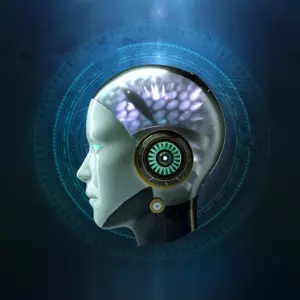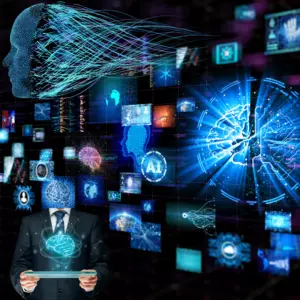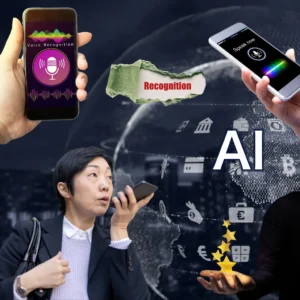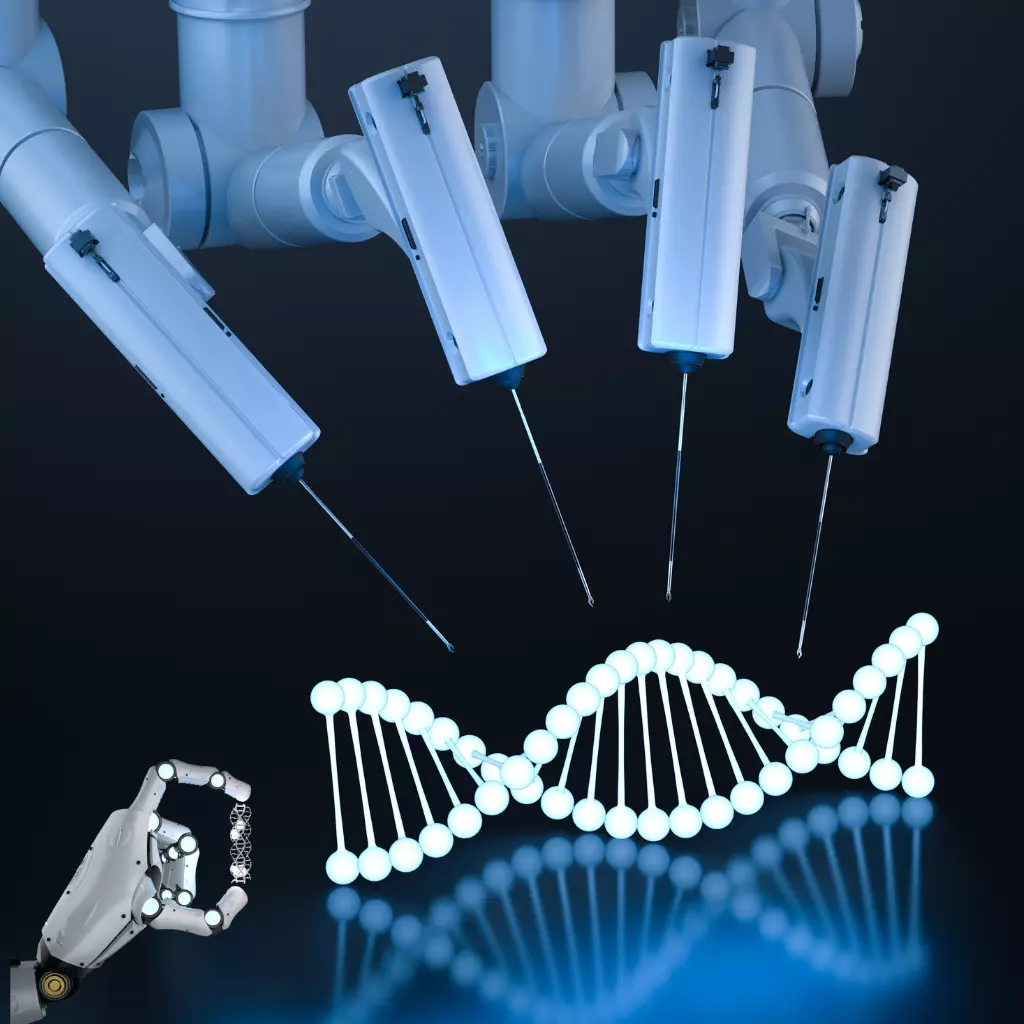
AI in Genetic Data Analysis
Personalizing Medicine
In healthcare, the fusion of artificial intelligence (AI) and genomics is opening doors we once thought locked. AI in genetic data analysis is not merely an advancement; it’s a transformation, reshaping how we approach predictive genetics and personalized therapy.
Researchers and physicians are achieving previously unreachable insights by harnessing vast genetic databases and powerful AI tools. The possibilities are exciting, with patient-specific treatments and therapies now on the horizon. Yet, as with all great leaps, there are challenges and considerations, especially when data and ethics intersect.
This article unfolds this vibrant tapestry, painting a picture of where we stand, where we’re headed, and AI’s pivotal role in decoding our essence. Join us on this journey to the heart of personalized medicine.
Table of Contents
Introduction to AI in genomics
In the last decade, genomics has experienced an explosive growth. This science, focusing on the study of genomes, has been rapidly evolving, and with it comes a massive influx of data. Enter AI in genetic data analysis. Artificial Intelligence, with its prowess in handling and interpreting vast amounts of data, is a perfect companion for genomics.
Traditional genomic analyses used to take several hours or even days to reach conclusions. AI-powered genetic data tools have now cut this time down significantly, producing results faster and with enhanced accuracy. More than just speed, AI brings to the table predictive analytics. With predictive genetics, we’re not just understanding current genetic structures but forecasting potential future genetic manifestations.
The combination of genomics and AI is more than just complementary; it’s revolutionary. Together, they’re charting a course for breakthroughs in personalized medicine, disease prediction, and more. As we delve deeper into this article, you’ll uncover how AI-driven genomics shapes our healthcare landscape and unlocks the mysteries of our genetic blueprint.
The power of predictive genetics
The future of medicine isn’t just about what’s currently happening in our bodies but also about what could happen. This is the essence of predictive genetics. At its core, it’s the study of how our genes might dictate future health scenarios, whether disease predisposition or treatment responses.
But the sheer complexity and vastness of human genetic data posed challenges. Historically, understanding these data intricacies was like finding a needle in a haystack. That’s where AI in genetic data analysis steps in. With the prowess of machine learning and AI, we can now sift through immense genetic datasets, identifying patterns and markers that would be impossible for the human eye to discern.
This fusion of AI and genetics has empowered us to forecast health risks, allowing proactive measures rather than reactive ones. Imagine tailoring your lifestyle today based on insights about potential health challenges decades later. It’s now a reality. By tapping into the combined might of AI-driven predictive genetics, we’re ushering in an era where healthcare is proactive, personalized, and more powerful than ever.
Personalized medicine and therapy
Gone are the days when one-size-fits-all treatments were the norm. The world is pivoting to an era where medicine is tailored to the individual, and at the heart of this revolution is personalized medicine. It’s about crafting treatments as unique as our DNA, ensuring the highest chances of success.
How does AI in genetic data analysis fit into this? Magnificently. By diving deep into our genetic blueprint, AI algorithms can pinpoint the minutest variations that might impact how one responds to a drug or therapy. While traditional methods may give general recommendations, AI-enhanced plans offer insights at an individual level.
From cancer treatments to managing chronic ailments, personalized therapy with genomics is the beacon of hope for many. Patients are now armed with treatments and medicines derived from their genetic makeup, exponentially increasing success rates. The journey from being a patient to becoming a survivor or managing conditions better has been drastically shortened, thanks to the symbiotic relationship between genomics and AI.
With the insights gleaned from AI-driven genetic data analysis, the medical realm is taking significant strides towards making medicine personal, potent, and precise.
Advancements in genetic research
The field of genetics is like an ever-expanding universe. Each year, we uncover layers of knowledge that redefine our understanding of life. Central to these revelations is the role played by advancements in genetic research, particularly those empowered by AI in genetic data analysis.
Once, sequencing the human genome was a monumental undertaking in terms of time and resources. Now, it’s almost routine. The enhanced speed and precision of AI exponentially expanded our data pools. This has provided a treasure trove for geneticists, enabling them to draw more profound, nuanced conclusions.
Yet, it’s not just about quantity. AI in genetic research means quality, too. Algorithms can detect subtle genetic variations, which traditional methods might have overlooked. This has led to breakthroughs in understanding genetic predispositions, evolution, and potential genetic modifications.
From tracing ancestral lineages to predicting the future of entire species, AI-driven genetic research is paving the way. The frontier of what we can achieve constantly expands, and as AI becomes even more intertwined with genomics, the potential is boundless. The rhythm of discovery is relentless in the intricate dance of genes and algorithms.
Genomic data storage and analysis
The world of genetics is teeming with data. Every sequenced genome adds gigabytes of information, and with millions sequenced annually, the storage scale becomes colossal. Herein lies the challenge: storing this deluge of data securely and efficiently.
In response, advances in cloud storage and decentralized systems have come to the fore, ensuring that the ever-growing genomic databases are accessible yet protected. But storing is just half the battle. Enter AI in genetic data analysis.
Artificial Intelligence isn’t just a tool; it’s the catalyst for transforming raw genetic data into actionable insights. With the scale of genomic data, manual analysis is akin to counting stars in the night sky. AI-driven data tools, however, parse this information in a flash, highlighting patterns, anomalies, or connections.
Whether it’s predicting a disease, understanding a genetic mutation, or devising targeted therapies, efficient genomic data analysis with AI ensures precision. Our collective knowledge deepens as researchers and clinicians access and interpret data more seamlessly.
To sum it up, as the mountains of genomic data rise, so do the methodologies to store and dissect them. And AI is undeniably, at the helm of this evolution.
Ethical considerations in AI and genetics
As we delve into the frontier of AI in genetic data analysis, we face a conundrum: the ethical implications. While powerful, the marriage of AI and genetics also treads on delicate terrain.
Firstly, there’s the matter of privacy. With vast genomic databases accessible to AI algorithms, how do we safeguard personal genetic data? A leak or misuse could lead to discrimination or bias, especially in sectors like insurance or employment.
Then there’s the arena of predictive genetics. If AI algorithms can forecast potential genetic conditions, should individuals be informed of all possible outcomes, even if they’re not actionable or might induce undue stress?
Furthermore, AI in genetic research could lead to potential genetic modifications. The ability to ‘edit’ genes using technologies like CRISPR and AI’s predictions can pose ethical dilemmas. Where do we draw the line between preventing disease and designing desired traits?
In essence, integrating AI and genomics is like a double-edged sword. While the potential for advancements in medicine and healthcare is monumental, it is imperative to tread cautiously, ensuring that ethical considerations remain at the forefront of this brave new world.
Economic implications
The fusion of AI in genetic data analysis isn’t just a scientific marvel; it’s an economic game-changer. As the realms of artificial intelligence and genomics converge, the ripples felt across the economic landscape are profound.
At the forefront, there’s the cost of healthcare. Personalized therapy with genomics, driven by AI insights, can lead to more effective treatments, thereby reducing prolonged hospital stays and recurrent treatments. In the long run, this can translate to significant savings for healthcare systems and patients.
Research and development also stand to benefit. AI in genetic research can expedite the drug discovery process. By swiftly analyzing genetic data, pharmaceutical companies can streamline their analysis, leading to quicker drug development and market release. The efficiency brought by AI could reduce the exorbitant costs typically associated with drug discovery.
However, there’s a flip side. The initial investment in AI-driven genomic tools and databases is substantial. Institutions need to invest heavily in infrastructure and skilled personnel. Moreover, as demand for professionals adept in AI and genetics surges, we might see a spike in salary expectations, influencing labour market dynamics.
Case study: Genomic breakthroughs with AI
The tale of DeepGen, a bioinformatics startup, illustrates the transformative power of AI in genetic data analysis. A few years ago, DeepGen embarked on a mission to identify genetic markers for a rare neurodegenerative disorder, traditionally a time-intensive endeavour.
Utilizing deep learning algorithms, the company swiftly analyzed thousands of genomes, identifying subtle variations that had eluded traditional research methodologies. These AI-driven genetic research techniques reduced the analysis time from years to mere weeks and highlighted multiple genetic markers, some previously unknown.
But DeepGen didn’t stop at identification. Harnessing the insights from predictive genetics, they collaborated with pharmaceutical companies. The outcome? Tailored therapeutic strategies designed based on the AI-identified markers, leading to more promising treatment outcomes.
This case exemplifies the immense potential of AI in genetic research. AI is revolutionizing the genomic landscape by accelerating data analysis, pinpointing accurate genetic markers, and facilitating the creation of personalized therapies.
DeepGen’s success story underscores a clear message: Embracing AI in genomics is not just the future; it’s the present. And those who harness its potential are poised to lead in breakthrough discoveries and transformative solutions.
Training and education for geneticists
In today’s rapidly evolving scientific landscape, the role of a geneticist isn’t just limited to understanding genes. With the increasing integration of AI in genetic data analysis, the toolkit required for modern geneticists is expanding.
Traditional curricula focused mainly on molecular techniques, gene sequencing, and genetics theory. It’s becoming imperative to infuse AI, machine learning, and data analytics lessons. Geneticists need to be fluent in both the language of genes and algorithms. This duality ensures they can harness the power of AI-driven tools, optimizing their research and diagnostics prowess.
Universities and institutions are recognizing this shift. Many now offer specialized courses combining genetics with AI modules to produce professionals adept at AI in genetic research. Moreover, workshops, seminars, and online courses are mushrooming, targeting mid-career geneticists aiming to upskill.
Beyond formal education, the onus is also on industry leaders and research institutions. They should foster environments encouraging continuous learning, ensuring their teams remain at the cutting edge of genetic counselling with AI tools and other advancements.
In conclusion, as genetics and AI continue their symbiotic dance, adapting our training and education approaches is beneficial and essential for future success.
Gazing into the future
As we stand on the cusp of a new era, the fusion of AI in genetic data analysis beckons a future brimming with possibilities. But what does this future look like?
For starters, predictive genetics will take centre stage. Imagine a world where diseases are not just diagnosed but predicted, allowing for proactive interventions. AI will sift through vast genomic databases, pinpointing potential health risks with unparalleled precision enabling early therapeutic strategies.
Further, personalized therapy with genomics will be the norm rather than the exception. No more one-size-fits-all. Treatments will be tailor-made and optimized to each individual’s genetic makeup, ensuring higher success rates and reduced side effects.
On the research frontier, AI in genetic research will drive revolutionary breakthroughs. From understanding the intricacies of genetic disorders to facilitating the creation of next-gen therapeutic solutions, the AI-genomic alliance promises transformative advancements.
However, as we stride into this bright future, the imperative to address ethical concerns in AI-driven genomics remains. Striking a balance between innovation and ethical considerations will be pivotal.
As we gaze ahead, the marriage of AI and genetics promises a new chapter in medicine and a paradigm shift. In this future, healthcare is proactive, personalized, and, above all, revolutionary.
Conclusion
The transformative power of AI in genetic data analysis has ushered in an era where predictive genetics offers glimpses into our health futures, allowing us to act proactively. As we’ve witnessed with cases like DeepGen, AI in genetic research is accelerating discoveries and redefining them. These advancements, in turn, pave the way for personalized therapy with genomics, ensuring each individual receives treatments tailored to their unique genetic blueprint.
However, with these monumental shifts come challenges. As we dive deeper into genomic databases and AI, the emphasis on safeguarding sensitive genetic information grows, highlighting significant ethical concerns in AI-driven genomics. And while the economic prospects are vast, the financial aspects of AI in genetics are twofold, promising both gains and significant investments.
To harness the full potential of this convergence, the emphasis on training geneticists in the AI age is paramount. Additionally, the evolving landscape will inevitably see the rise of new tools, redefining genetic counselling with AI tools.
As we gaze into the future, it’s evident that the synergy between AI and genomics will shape the healthcare landscape, presenting opportunities, challenges, and a renewed hope for transformative medical breakthroughs.
Related Articles
- AI in Telehealth: Revolutionizing Remote Care
- Navigating the Next: AI’s Role in Healthcare Predictive Analytics
- Transforming Medical Imaging with AI Capabilities in Radiology
- AI in Genetic Data Analysis: Personalizing Medicine
- AI in Diagnostics: A New Era of Precision and Accuracy
- Smart Hospitals: The Role of AI in hospital operations
- Mental Health Tech: AI-powered Mental Health Apps for Assessment and Therapy
- AI-Powered Drug Discovery: A Revolution in Pharma
- Medical Robots Enhanced by AI: Transforming Surgeries and Care
- Wearable Health Tech: AI-driven health wearables
- AI’s role in chronic disease management
- Neural Interfaces and AI: Bridging Minds and Machines
- Digital Health Platforms: The Power of AI Integration
- AI in Epidemiology: Predicting and Controlling Outbreaks
- AI in Rehabilitation: Personalized Recovery Pathways
- AI in Predictive and Preventive Care: A Proactive Approach
- AI in Home Healthcare: Personal Health Management
- Revolutionise Healthcare with IPA Tools: Streamlining Processes, Improving Efficiency, and Enhancing Patient Care
- Other Articles on AI Usage in Healthcare
- Other Articles on AI usage in different industries

Arindam Roy
An Automation Consultant with 25+ years of IT Experience
Forbes Articles related to AI usage in Healthcare:



